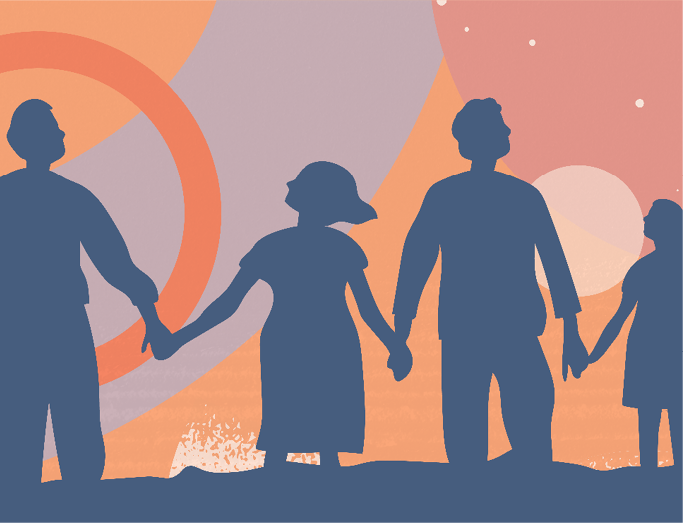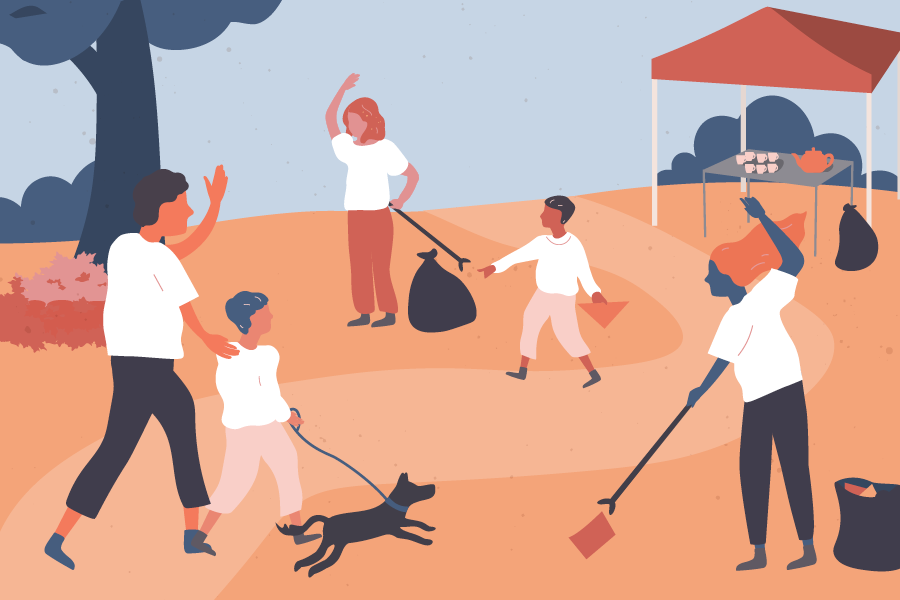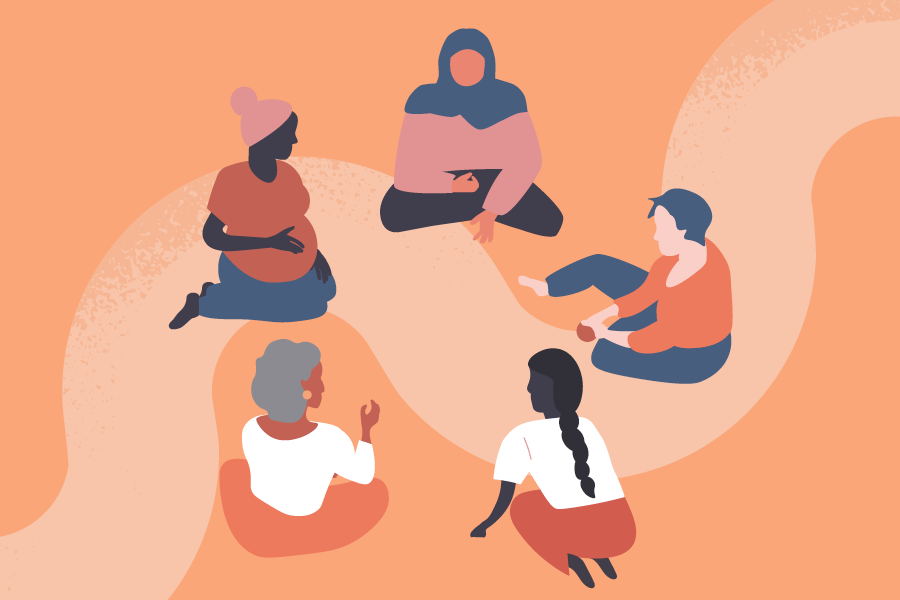In brief
On 27th July 2022, we co-hosted an event with Save the Children to celebrate and explore the stories that young people shared with us through The Lookout. We were joined by two of our Chief Listeners – Mete Coban and Kirsty McNeil – who shared their responses, and heard from one of the young people who contributed, Shahd. Thank you to everyone who came along and who contributed to the event.

In the Summer of 2021, in partnership with Save the Children, we set up The Lookout – a space for children and young people to make sense of their experiences of the pandemic so far, process the effect that it’s had on their relationships, and share what they want to see change going forward with our panel of Chief Listeners.
In July 2022, 50 of us came together to honour, celebrate and explore what we heard.
Listening matters
We heard from Catriona Maclay, who led The Lookout, how important it was to young people to feel listened to, and for their perspectives to be genuinely valued.
Young people were really motivated when they heard that a panel of adults – and very illustrious adults – are listening. Just listening, and showing that you’re listening, matters
In making the commitment to genuinely listen, our Chief Listeners were reminded of all that we can learn from young people.
As always when listening to children, I learnt a lot from being a Chief Listener. Children inspired me with the reminder that they are great egalitarians, great empaths and great emerging leaders
We need to give young people platforms to speak out, to be heard, rather than imposing our own assumptions about what they think and what they need. We need more intergenerational dialogue about the big issues of their time. Young people are really passionate about these issues and we need to engage with them
Same storm, different boats
We often fall into the trap of thinking about young people as one homogenous group but, like any group, they all have very different experiences. It’s important to think about intersectionality
Young people were always quick to remind us that they’re all very different and can’t be lumped together. We heard through The Lookout that for some, their main fears were the safety of loved ones. For others, the toughest thing was the effect that the pandemic has had on their mental health, or that of their friends. Others struggled most when lockdowns ended and they were faced with the daunting prospect of socialising once again.
Recognising and respecting the different experiences, challenges and needs of young people must lie at the heart of our response as a wider society.
Two years are much more significant at a formative stage than they might be for the middle aged. It may be too soon to judge how the diversity of experience will have influenced the long term impact. Identifying and responding to the deep tissue damage isn’t something that we can do quickly and it isn’t just the responsibility of schools. We need to keep making the case for the resources to do this well, for as long as it takes.
Empathy in abundance
We heard from Shahd, a school leaver who took part in The Lookout, about the concern she felt for her grandparents and the gratitude she felt for the support of her teachers. We were reminded and humbled by the abundance of empathy that came through in all of our conversations with young people.
My word, the empathy of children. Because they have such rich inner worlds we sometimes forget that they are picking up on everything that surrounds them. They had their own cares and concerns about what Covid meant for them, but they were also absorbing adult stress too. It’s striking how thoughtful children were about why what their teachers and parents and grandparents were going through might all be different and that they’d need support in different ways. We’d all do and be better if we thought about that more
Whilst this depth of empathy has underpinned the many sacrifices that young people have made, they have felt let down by the apparent lack of reciprocity from adult society. Children first is the common response to disaster. In Covid the opposite was true. Schools were closed before pubs, with little or no additional resource to support students who struggled.
A debt to be paid
Perhaps more so than any other age group, young people have been asked to sacrifice a lot over the pandemic. None of those we spoke to were bitter about this – empathy and a burgeoning sense of citizenship underpinning a willingness to play their part.
But now, there’s a debt to be repaid. Many young people feel they’ve upheld their end of the bargain but have been let down by those in power. A recent poll by the Youth Democracy Index revealed that 53% of young people don’t trust politicians.
You told me my whole life that education really matters – that every exam really matters – but it’s been put into chaos
I’ve done everything the system has told me to do. I’ve worked hard, I’ve got a good education but I’m still struggling
It’s not only study and exams that were disrupted and missed. Important milestones were lost entirely: leaving celebrations, for instance, particularly for Year 6s but also for older students, and Year 7 inductions. The childhood transition points can be difficult enough with the best of management but when children are losing old classmates and not meeting new ones for many months, the experience will be particularly traumatic. Exams can be postponed but these transitions will never be rescheduled.
As a priority, adult society must repay this debt, addressing the needs that young people told us are most pressing for them in the coming months and years:
1. The time and space to reconnect with important people in their lives – both in their personal networks and in the “middle rings” of wider acquaintances. Adult society needs to recognise the importance of this, and not interpret everything that has been lost in terms of narrow “catch-up” frames
2. A rounded package of support which goes beyond catching up on missed curriculum. Young people want to do well in education and are frustrated when they are put under pressure without sufficient help or by unfair parameters. But they also need the wider experiences and sources of support that they have missed over lockdown.
3. A more equal society which works better, for everyone. Young people had their own experiences of the inequalities that were reinforced by the pandemic, and they expect change.
If we don’t learn from all that has happened in the last few years we’ll have missed a big opportunity to build a better society
Hope for the future
Whilst there is much to feel troubled and burdened by in current times, hearing from young people reminded us that there is hope to be found.
For many the enforced experience of isolation and reflection led to an awareness of issues, and of personal agency, that might not have emerged in more conventionally busy times. It is difficult to separate the influence of Covid from the emergence of the Black Lives Matter and climate change movements, but the interest and hunger for engagement was prominent in many conversations and felt, to experienced listeners, different and special.
Children’s leadership potential is limitless. Their understanding of the hidden wirings of our society came through so clearly in the report and their vision isn’t clouded by inertia or commitment to the status quo. They see what’s wrong and they say what’s wrong and they work out how things could be better for everyone. That’s leadership in action
Nurturing the next generation of leaders means tending to the conditions that will enable them to flourish, to grow, to access the support that they need, and to build and rebuild the relationships that have been lost over the past 2 and a half years.
One of the quotes from the report I keep coming back to is the one about children having lost whole years of their lives they can’t ever get back. I often reflect on how good and bad childhoods follow people around forever and you only have one chance to get them right. The chance to do it differently during Covid is gone, but the chance to learn by listening is available to all of us every day. I’m so grateful I got this chance, this way
Full responses from our Chief Listeners
Each of our 8 Chief Listeners responded to the stories and perspectives shared in the Citizen’s Rising report. Here’s what they said
Dear young people, It was a pleasure to read your views and experiences of the covid 19 pandemic. I think two things jumped out for me:
• A year is a large proportion of the time you have been alive, anything from 4%-20% for people aged 25-5 years old. To have spent such a large proportion of your life so far in difficult circumstances because of a pandemic is very unsettling.
• Adults have spent lots of time talking about academic catchup for young people in education but it seems that what many of you would really value is support in ‘catching up’ and readjusting socially, emotionally and mentally.
I shall have the two things in my mind during my work to prevent young people becoming involved in violence and ensuring that safe outdoor spaces are accessible to, and useful for, as many different types of people as possible. Thank you for your openness and honesty.
The covid crisis demanded an emergency response, relying on the resilience of large swathes of the nation, including children and young people. I commend the work of The Relationships Project for ‘The Lookout’ report which stepped into the experience of a generation shaped by the pandemic. The findings will make an important contribution to our national recovery. Our young people felt they had to grow up quickly, grappling with uncertainty, isolation and illness while their support networks became stretched. While marginalised during the pandemic, the needs of young people must be front and centre of the recovery. Their skills and resilience are crucial assets as we rebuild our society together.
The contributions of the young people (and adults) in the Lookout, moved me, inspired me, and gave me a feeling of hope. Also, at the same time, deep sadness. Sadness around the challenges that young people have had to face, and are facing, as a result of the pandemic particularly the themes expressed of fear, loss and isolation. Hope comes from the evident resilience, an appreciation of the value of connections and for some, seeing social issues in a new light and realising that they can make a difference in change for the better. As we move forward, if we want to look back on the covid years as a time we changed for good, then tapping into the wisdom of young people is so important; as is find ways to continue listening and ensuring they are able to express their unique feelings, thoughts and ideas – and be heard.
I’m so grateful to the young people who contributed to The Lookout for being so honest and thoughtful. I can see that many of you have had tough experiences, but also stepped up to help your families and communities. We absolutely must make sure that you get the support you need for education, for community activities, for mental health, and for rebuilding relationships with all the wide mix of people you need in your lives. We must also make sure that we use your energy and ideas for building a better world. Thanks for using your voices to help make that happen.
To all the young people who contributed to this valuable report – thank you. We have heard what you need to recover and rebuild from your experiences of the pandemic and are working hard to respond. Relationships are central to the work we do at UK Youth and we understand their value and impact. A relationship with a youth worker is a key part of the ‘middle rings’ of the relationship circle, and accessing youth work provides the opportunity to build new relationships with peers. The relationship with a youth worker is unique as it is voluntary, long-term and is built on trust – making it such an important relationship for young people. The youth sector has suffered through the pandemic and vital services for young people were lost in communities, along with connections to youth workers. We are rebuilding the youth sector to ensure that young people can reconnect, or connect for the first time with youth workers to access the support, experiences and opportunities that they need to thrive. We want to create a social that understands, champions and delivers effective youth work to all.
Nelson Mandela once said ‘There can be no keener revelation of a society’s soul than the way in which it treats its children.’ Listening to those that took part in The Lookout suggests we all – family, local services and government – need to think carefully about the lived experiences of our children and young people during the pandemic. They clearly tell us some of what they have gained and some of the experiences they have lost from the restrictions to their day to day relationships. Policymakers, particularly, need to ensure we don’t let schooling get in the way of education; and that the local services for children, families and young people are themselves helped to recover quickly.
Children and young people have done extraordinary things for us adults over the last few years. The sacrifices they have made – and the worries they have shouldered – must never be forgotten and we all have a lot of work to do to show them the same love and interest that they have gifted to their families and communities. I have learnt so much listening to their stories and advice and promise everyone at Save the Children will work hard to build a world that’s worthy of what children have done.
I want to say a huge thank you to all the young people who shared such powerful insights. I was particularly struck by how many of you were getting interested and involved in making change in society. This is so great to see, and we definitely need to support you to be leaders in your communities, in tackling social problems, and in politics. Please keep up the great work on communicating what young people need, and being leaders yourselves in making change.
Read more

Letting the nation in: how a drive to promote relational practice could boost mission-based government
Introduction Nine months have passed since the general election. A new PM and a new generation of ministers have settled into post. They have had time to assess the legacy from the last administration and familiarise themselves with the ongoing work of every...

A relational approach to public policy: why it’s now essential
Introduction Nine months have passed since the general election. A new PM and a new generation of ministers have settled into post. They have had time to assess the legacy from the last administration and familiarise themselves with the ongoing work of every...
